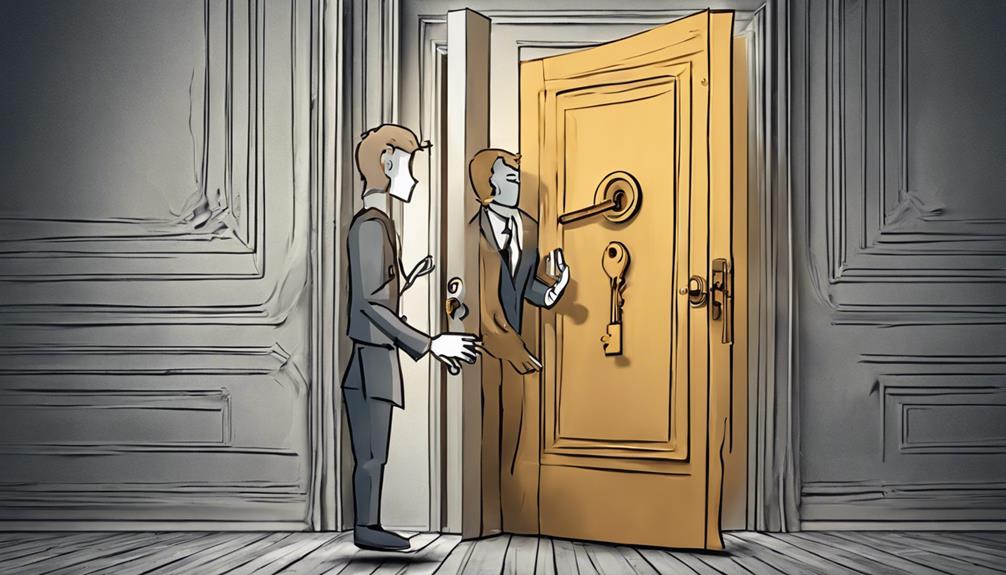Consider a situation in which a partner with narcissistic traits shows clear signs of irritation whenever their significant other is commended for an achievement. This behavior could be just a glimpse of the deeper levels of jealousy that narcissists can feel.
Understanding the intricacies of narcissistic jealousy and the key signs to watch out for can shed light on the complexities of these individuals' behaviors.
Stay tuned to uncover the subtle yet telling indicators that reveal the presence of jealousy in narcissists and the impact it can have on relationships.
Key Takeaways
- Narcissists experience jealousy rooted in deep insecurity and fear of inferiority.
- Signs include constant comparison, sabotage, and control tactics for dominance.
- Lack of empathy and fragile self-esteem drive toxic jealousy behaviors.
- Recognizing envy, insecurity, and power dynamics is crucial in navigating relationships with narcissists.
Understanding Narcissistic Jealousy
Understanding narcissistic jealousy provides valuable insights into the complex dynamics of individuals exhibiting this trait and its impact on relationships. Narcissistic jealousy stems from deep-seated insecurity and a fear of inadequacy inherent in individuals with narcissistic personality disorder. This envy often surfaces in response to others' successes and accomplishments, triggering toxic behaviors like sabotage and exclusion.
The jealousy displayed by narcissists isn't merely a fleeting emotion but rather a pervasive and enduring trait that influences their interactions with others. When confronted with situations that challenge their self-perceived superiority, narcissists may resort to denial, accusations, or attempts to undermine those they view as threats. Recognizing these patterns of jealousy is essential for establishing healthy boundaries and navigating relationships with individuals exhibiting narcissistic traits.
Signs of Envy and Insecurity

Envy and insecurity in narcissists manifest through a range of observable signs that reflect their deep-seated feelings of inadequacy and resentment towards others. When dealing with individuals exhibiting these traits, it's essential to recognize the following signs:
- Constant Comparison: Narcissists often compare themselves to others, feeling inadequate when they perceive someone as more successful or accomplished.
- Excessive Criticism: They may excessively criticize others to mask their own insecurities, projecting their feelings of inadequacy onto those around them.
- Sabotaging Behavior: In an attempt to feel superior, narcissists might engage in behaviors aimed at undermining the success or happiness of others.
These signs of envy and insecurity can lead to negative emotions such as resentment and anger, making it challenging for narcissists to establish and maintain healthy relationships. Addressing and acknowledging these feelings is crucial in helping them manage their behavior patterns and foster more positive interactions with others.
Control and Power Dynamics
In exploring the dynamics of control and power within relationships involving narcissists, it becomes evident that jealousy serves as a strategic tool for manipulation and dominance. Narcissists often employ various control tactics to assert power over their partners through jealousy. These tactics can include monitoring their partner's activities, gaslighting to distort reality, and emotional manipulation to maintain control. By understanding the power dynamics at play when jealousy arises, one can begin to recognize the toxic behaviors exhibited by narcissists in relationships.
| Control Tactics | Power Dynamics | Manipulating |
|---|---|---|
| Monitoring | Asserting dominance | Emotional manipulation |
| Gaslighting | Maintaining power | Distorting reality |
Recognizing these signs can help individuals identify and address the detrimental impact of narcissistic jealousy on their relationships. By shedding light on these behaviors, individuals can empower themselves to navigate these challenging dynamics and seek healthier connections.
Lack of Empathy and Connection

Narcissists' deficiency in empathy significantly hinders their ability to establish genuine emotional connections with others. This lack of empathy can manifest in various ways, impacting their emotional dynamics and relationship dynamics:
- Self-centered Focus: Narcissists often prioritize their own emotions and needs above others, leading to a lack of consideration for how their actions affect those around them.
- Difficulty Recognizing Emotions: They may struggle to recognize or respond appropriately to the emotions of others, creating barriers to forming meaningful connections.
- Inability to Empathize: Due to empathy deficits, narcissists find it challenging to understand or empathize with the feelings of those they interact with, resulting in shallow or superficial relationships.
Understanding these aspects of a narcissist's lack of empathy is crucial for those navigating relationships with them. By recognizing these patterns, individuals can approach interactions with empathy and awareness, potentially fostering healthier and more fulfilling connections.
Fragile Self-Esteem Indicators
Upon examining the impact of a narcissist's lack of empathy on relationships, it becomes evident that fragile self-esteem indicators play a pivotal role in understanding their behavior patterns. Fragile self-esteem in narcissists can lead to intense jealousy reactions, often triggered by deep-seated insecurities and fear of inferiority. Signs of fragile self-esteem include hypersensitivity to criticism and a constant need for validation, which can manifest as controlling or manipulative behaviors in relationships. Jealousy in narcissists is often rooted in their fragile self-esteem, causing them to feel threatened by others' success or attention.
| Fragile Self-Esteem Indicators | Description | Examples |
|---|---|---|
| Hypersensitivity to criticism | Reacting strongly to feedback | Becoming defensive or lashing out |
| Constant need for validation | Seeking approval and reassurance | Fishing for compliments or attention |
| Controlling behaviors | Exerting power and dominance | Dictating actions or isolating a partner |
Fear of Inferiority and Abandonment

We observe that narcissists' fear of inferiority and abandonment can manifest in various ways, sparking jealousy and possessiveness. This fear stems from their fragile self-esteem and the need for constant validation.
Understanding these dynamics can shed light on the complex behaviors exhibited by narcissists when faced with perceived threats to their self-worth.
Inferiority Complex Signs
Signs of an inferiority complex in individuals with narcissistic traits often manifest through a constant need for validation and reassurance from others. This need for external validation stems from deep-seated insecurities and a fear of being perceived as inadequate. Specific signs of an inferiority complex in narcissists include:
- Fear of Abandonment: Narcissists with an inferiority complex may have an intense fear of being abandoned or rejected, leading to clingy or dependent behavior.
- Seeking Validation: Constantly seeking approval and validation from others to validate their self-worth and importance.
- Controlling Behaviors: In an attempt to avoid feelings of inferiority, narcissists with an inferiority complex may exhibit controlling behaviors in relationships to maintain a sense of power and superiority.
Abandonment Fear Behaviors
Experiencing deep-seated feelings of inferiority and inadequacy, narcissists often exhibit abandonment fear behaviors as a means to counteract their underlying fear of being abandoned. This insecurity can manifest in controlling behaviors within relationships, where they seek constant validation and attention to quell their abandonment fears.
The fear of being left or replaced stems from their fragile self-esteem and the constant need for external affirmation. This fear can drive possessiveness and jealousy, creating a cycle of seeking control to alleviate their inner anxieties. Addressing and understanding these abandonment fears is essential for fostering healthier relationships and aiding personal growth in individuals grappling with narcissistic tendencies.
Pursuit of Perfection and Superiority

In the pursuit of perfection and superiority, narcissists often fixate on maintaining a grandiose self-image that fuels their jealousy towards those they perceive as more successful or admirable. This drive for perfection can create a competitive mindset that leads to envy and resentment towards others who achieve recognition or praise.
Here are three key behaviors that showcase how the pursuit of perfection and superiority intertwines with jealousy:
- Competitive Behaviors: Narcissists may engage in actions aimed at undermining or outshining those they see as superior, driven by their jealousy and need to maintain a sense of superiority.
- Constant Comparison: The fixation on perfection often results in narcissists constantly comparing themselves to others, leading to heightened jealousy when they perceive someone as more accomplished or successful.
- Inability to Accept Imperfections: The struggle to accept their own flaws makes narcissists particularly sensitive to the success of others, triggering jealousy and a need to prove their superiority.
Hostility Towards Criticism

When faced with criticism, narcissists often display defensive behaviors that shield them from feelings of vulnerability and inadequacy. This hostility towards criticism stems from their deep-rooted need to maintain a facade of perfection and superiority.
Defensive Behavior Patterns
Defensive behaviors, characterized by hostility towards criticism, are common traits exhibited by narcissists when their self-image is threatened. When faced with criticism, narcissists may resort to defensive behavior patterns such as:
- Blaming others: Narcissists often deflect criticism by shifting blame onto others to protect their fragile self-esteem.
- Denying responsibility: They may refuse to acknowledge any wrongdoing, avoiding accountability for their actions.
- Attacking the critic: In an attempt to maintain their self-image, narcissists may attack the credibility of the person offering criticism.
These defensive responses stem from feelings of inadequacy and insecurity, prompting manipulative behaviors to safeguard their perceived self-worth. Understanding these patterns can aid in navigating interactions with narcissists more effectively.
Avoidance of Vulnerability
Avoidance of vulnerability through hostile reactions to criticism characterizes narcissists' defensive responses. This behavior serves to shield their grandiose self-image from perceived threats, stemming from deep-rooted insecurity and a fragile ego. Narcissists often react defensively, angrily, or dismissively when faced with criticism, as they strive to maintain a facade of invulnerability and superiority. This defensive mechanism not only affects their mental health but also contributes to the cycle of jealousy and envy within narcissistic individuals.
The inability to accept their own flaws and limitations fuels their hostile responses to criticism, perpetuating their struggle with vulnerability and feelings of inadequacy. Understanding these dynamics is crucial for recognizing and addressing the complexities of narcissistic behavior.
Patterns of Manipulative Behavior

In examining patterns of manipulative behavior in narcissists, one can observe a calculated use of tactics like gaslighting, lying, and guilt-tripping to assert control and influence over others. These behaviors serve to create a toxic environment where manipulation thrives and control is maintained at the expense of others.
Manipulative behavior in narcissists often includes:
- Gaslighting: Narcissists may distort reality, causing others to doubt their own perceptions and memory, ultimately undermining their confidence and sense of reality.
- Lying: Narcissists frequently engage in deceitful practices to manipulate situations in their favor, perpetuating a cycle of dishonesty that serves their agenda.
- Guilt-Tripping: By using emotional manipulation, narcissists make others feel responsible for their actions or emotions, inducing guilt and compliance in their targets.
These manipulative actions not only erode trust and create a sense of unease but also contribute to a controlling dynamic within relationships that can have detrimental effects on mental health and well-being.
Impact on Relationships and Mental Health

Jealousy in relationships involving narcissists can have profound impacts on both the emotional well-being of their partners and the overall dynamics of the relationship. Narcissists' constant need for attention and admiration can fuel their jealousy, leading to possessive behaviors and a desire to control their partners. This can create a toxic environment where the narcissist's partner may feel suffocated, manipulated, and unable to express themselves freely. Additionally, narcissists' struggles with intimacy and empathy can further exacerbate the negative effects of their jealousy on the relationship.
Setting boundaries is crucial when dealing with jealousy in relationships with narcissists. Partners need to establish clear limits on what behavior is acceptable and communicate their needs assertively. Seeking support from friends, family, or a therapist can also be instrumental in navigating the challenges posed by a narcissist's jealousy. Overall, recognizing the impact of jealousy in relationships involving narcissists is essential for maintaining both partners' mental health and well-being.
Frequently Asked Questions
What Are the Three C's of Narcissism?
The three C's of narcissism are grandiosity, entitlement, and lack of empathy. These traits reveal a sense of superiority, a craving for special treatment, and a disregard for others' emotions. Understanding them helps navigate interactions with narcissistic individuals.
What Is the Most Overlooked Symptom of Narcissism?
Recognizing the most overlooked symptom of narcissism is crucial. It reveals deep insecurities behind a facade of grandiosity. Understanding this hidden vulnerability can shed light on the true nature of narcissistic behavior, guiding us towards compassion and insight.
What's the Worst Thing You Can Tell a Narcissist?
Telling a narcissist they lack importance or specialness can trigger defensiveness. Criticizing their abilities may provoke feelings of inadequacy. Pointing out flaws can lead to anger. Challenging their superiority may result in manipulation.
What Are the Ten Symptoms of a Narcissist?
We observed ten key symptoms of narcissists. These behaviors include manipulation, lack of empathy, grandiosity, and a constant need for admiration. By recognizing these traits, we can better understand and navigate interactions with individuals displaying narcissistic tendencies.
Conclusion
In conclusion, navigating narcissistic jealousy can be like walking on eggshells in a minefield. Recognizing the signs early on is crucial for protecting our mental health and relationships.
Let's not let the green-eyed monster of jealousy consume us or those around us. It's important to address these toxic behaviors and set healthy boundaries to ensure we can thrive without being dragged down by the weight of insecurity and control.









